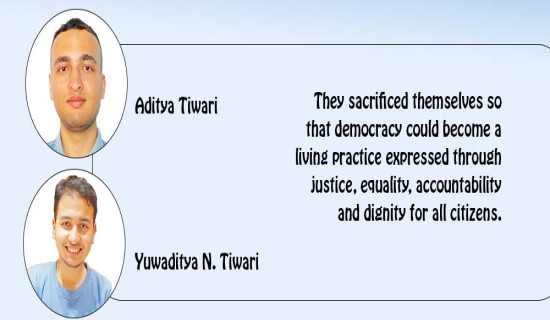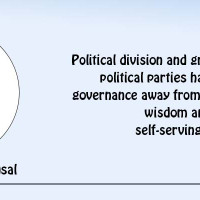- Saturday, 31 January 2026
Factors Behind Poor SEE Results
The announcement of the results of the School Education Examination (SEE), held from March 28 to April 9, 2024 by the National Examination Board, revealed the disappointing fact that out of 464,785 examinees, only 222,472 qualified for further study with different grades, and the rest of 242,313 examinees were categorised as non-graded because they failed mainly in mathematics, science, English and economics subjects. Conventionally, 115,834 examinees, who scored a non-grade in up to two subjects, would be allowed to appear in the Grade Improvement Examination (GIE).
However, this time the Ministry of Education decided to conduct the GIE from August 7 permitting all of them to attend it despite their non-graded scores in all subjects against the usual practice that allowed more than three-subject failed students to appear in the examination of those subjects to be held next year. The Ministry may have, with positive thinking, reached this conclusion to rectify these disastrous results by enabling the students to answer the questions related to their subjects by delivering classes through different media such as TV, radio, etc. The ground reality, nonetheless, does not support it. In fact, there are some other reasons behind it.
Shortage of teachers
Firstly, there is no sufficient number of teachers in schools. In 2009, a commission led by Janardan Nepal, then joint secretary at the Ministry of Education, studied the condition of schools across the country, and suggested that the government create 50,000 vacancies of teachers from the pre-primary level to grade 12. The suggestion was ignored, and left unimplemented. In 2019, another commission was formed, which also suggested that 57,056 additional vacancies be created to ensure quality education in schools. Until now, this suggestion has not been implemented, and many schools have been suffering the lack of teachers.
Secondly, most of the teachers have been appointed on the basis of their affiliation to the political party rather than on the basis of quality and expertise. They are more loyal to their party and leaders than to the school and students. These teachers engage most of the time in party work, and their headmaster cannot control them as they are close to the power. As a result, classes of the students suffer. Many teachers have not received training for teaching, and they are not skillful to use needed teaching aids and materials to motivate the students. Some of them are incompetent in the subjects which they have been teaching because, due to the lack of subject teachers, they are compelled to teach the subjects which they had never studied when they were students. The fact that many teachers could not pass the examination conducted by the Teachers Service Commission in the past proves their inability and lack of expertise.
Thirdly, during the COVID-19, the SEE was suspended, and it was resumed only after two years. During this time, only internal examinations of class ten students were conducted by the schools. They passed their students without evaluating their knowledge in subject matters. It passed a harmful message on to the juniors, who conceived that SEE would be held only for formality, and nobody would fail in it. Such concept made them careless and inattentive to the classroom teaching.
Fourthly, according to the previous syllable, a school would hold 25 marks practical examination and the Secondary Examination Board would hold 75 marks theoretical examination. If a student secured 35 marks in a subject from both examinations – theoretical examination (27 out of 75) and practical examination (8 out of 25) – s/he would pass it. In such an examination, schools had a great role to pass their students. Therefore, at that time the per cent of SEE pass was higher than it is now because of the examination system; not because of the competence and ability of the students. This year, marking system had been changed, and students were required to secure at least 35 per cent marks both in practical and theoretical examination. The teachers had no role in marking theoretical examination papers. Consequently, many of the students could not secure 35 per cent mark in theoretical papers though they secured it in practical ones. Thus, this provision of the examination system has been instrumental in bringing about this undesirable result.
Change of examination system
Fifthly, reckless change of examination system had adverse effect on both teachers and students in their teaching and learning processes. As stated earlier, at the beginning, it was stated that students, who scored 35 per cent marks from both theoretical and practical examinations combined, were allowed to study class 11, those, who failed only in two papers, were allowed to appear in the GIE, and those, who failed in more than three subjects, would have to appear in the examinations of those papers next year, and they would be allowed to appear in such examinations only for three times. This time, at first, requirement was made for the students to secure 35 per cent marks both in theoretical subjects and practical subjects, and the GIE date for those who had failed only in two subjects was also announced to start from August 2 onward. Again, Ministry of Education hurriedly decided that all examinees, who had failed in any number of subjects, would be allowed to appear in the GIE, and it announced that it would be held from August 7 onward.
There are only about two weeks left for the examination to take place. As time for preparation is very short, students, who could not pass the examination after a year's engagement in learning, could hardly be expected to pass the examination. If this examination is held only for formality's sake, and if all the students are passed despite their poor performance, they will be the beast of burden for the school in class 11. As a matter of fact, good result requires delivery of quality education on a routine basis, which, in turn, is possible only by competent and proficient teachers cum good syllabus. Change in examination system according to wild whims and fancy of a man in power will invite only further disaster.
(The author is professor of linguistics.)
















